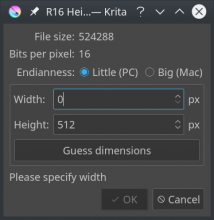New Import/Export dialog + rewrote how loading and saving is done for related file types. Fixes issues 381774, 381830, and 381866.
These formats have no official spec and no standard file extension, so I used output from World Machine to test it. World Machine can output .r16 for 16bit integer heightmaps and .raw for 8bit integer heightmaps. .raw files have to be renamed to .r8 for Krita to handle them.
Will add unit tests if it makes sense.

